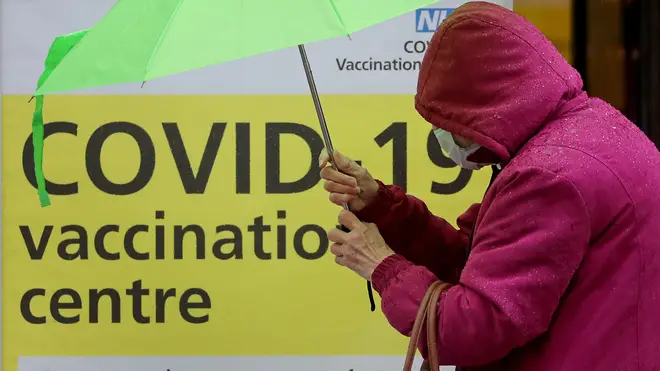
Tonight with Andrew Marr 6pm - 7pm
19 February 2021, 05:49 | Updated: 19 February 2021, 07:34

Age should be the dominant factor in deciding the next phase of the coronavirus vaccine rollout, a government vaccine advisor has said, as some reports suggest Britons as young as 40 could be offered the jab within a few weeks.
The head of the Joint Committee on Vaccination and Immunisation (JCVI) has said that age is likely to be a dominant factor in deciding who will be next in line to receive the jab.
The Daily Mail has reported that the age brackets could be wider than in the previous stage of the nation’s inoculation drive - meaning 40 to 49-year-olds are likely to be invited for a jab once the top nine groups get their first dose.
The Mail also reported that this means vaccines will be given on the basis of age, rather than prioritising key workers.
Professor Wei Shen Lim told an online audience of doctors that age "dominates by a long way" while underlying health conditions contribute "some increased risk", the Daily Telegraph reports.
The JCVI has not yet published plans on who should be vaccinated beyond the top nine groups, but has faced calls for police officers and teachers to be prioritised in the next stage.
Read more: Stay-at-home restrictions in Wales extended for three weeks as children return to school
Read more: Celebs launch campaign urging ethnic minority groups to #TakeTheVaccine

'Would you be injected with Covid for £4,500 minister?'
Appearing at an online event on Thursday night, Prof Lim said: "Age dominates by a long way, and almost all the underlying health conditions contribute some increased risk, but not a huge amount of increased risk."
Prof Lim said that one of the "great successes" of the vaccination programme had been the rate of deployment and this was now the "most important factor", according to the Daily Telegraph.
The newspaper also reports that the first "real world" data examining the impact of the vaccination programme suggests both the Oxford and Pfizer jabs cut two thirds of infections and transmissions.
Boris Johnson is understood to be expecting evidence on the impact of the UK's jabs programme on hospital admissions and deaths by the end of Friday, ahead of setting out his "road map" out of England's lockdown next week.

Sadiq Khan: 'If it were me bus drivers and officers would be vaccinated by now'
It comes as new data shows Covid-19 case rates are continuing to fall in all regions of England as the number of people vaccinated across the UK nears 17 million.
16,996,806 jabs have been given in the UK so far, with 16,423,082 first doses - a rise of 482,110 on the previous day - and 573,724 second doses - an increase of 15,147 on figures released the previous day.
According to the latest weekly surveillance report from Public Health England, in the East Midlands, the rate of new cases stood at 176.7 per 100,000 people in the seven days to February 14 - the highest rate of any region, but down from 228.4 in the previous week.
The West Midlands recorded the second highest rate: 170.4, down from 243.1. South-west England recorded the lowest rate: 87.4, down from 123.1.
Case rates in England are also continuing to fall among all age groups, Public Health England said.
The highest rate is among 30 to 39-year-olds, which stood at 192.5 cases per 100,000 people in the seven days to February 14, down week-on-week from 270.8.
Among 20 to 29-year-olds the rate dropped from 253.2 to 173.4, and for 40 to 49-year-olds it fell from 232.2 to 162.9.
For people aged 80 and over, the rate fell from 208.0 to 129.6.

Sociologist on vaccinated 'returning to normal'
Elsewhere, a range of health organisations have told the Prime Minister that guidance on PPE (personal protective equipment) must be updated to reflect the risks to medics and care workers from airborne transmission.
In a letter to Mr Johnson, they said that lives are being put at risk and branded measures to reduce airborne spread of the virus in high-risk health and care settings as "inadequate".
The coalition includes the Royal College of Nursing (RCN), British Medical Association, Royal Pharmaceutical Society and the Royal College of Midwives, among a number of others.
He will chair a virtual gathering of G7 leaders on Friday, including US president Joe Biden in his first major multilateral meeting, to discuss the response to the crisis.